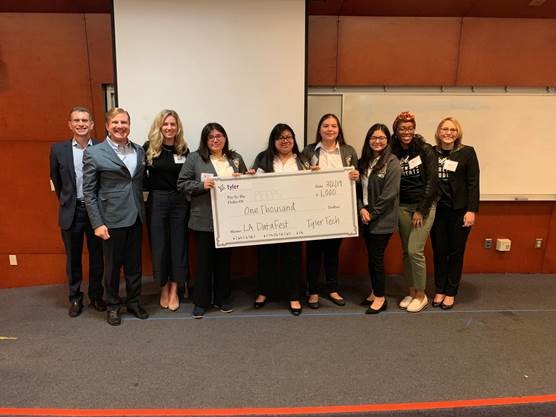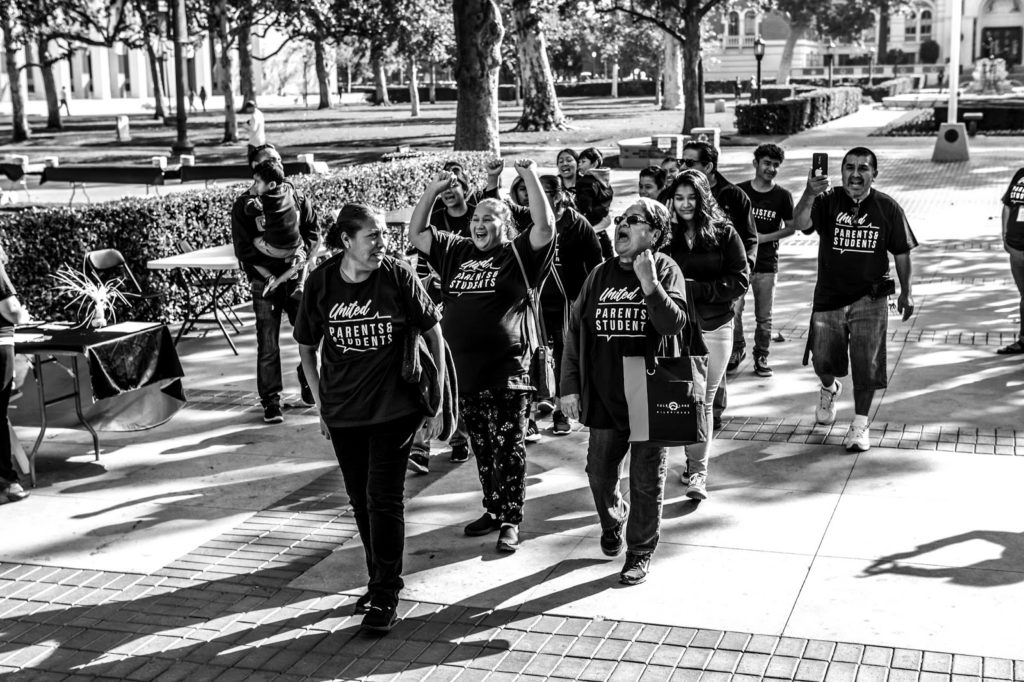Green Dot Students Dive Into Data to Propose Changes Across the City

This winter, Green Dot students from Ánimo Jackie Robinson (AJR), Ánimo Ralph Bunche (ARB), and Oscar De La Hoya Ánimo (ODLH) Charter High Schools participated in Los Angeles City Controller Ron Galperin’s L.A. DataFest competition. The competition matches high school students with UCLA mentors and teaches them how to work with city data to address issues affecting Los Angeles neighborhoods. At the end of the program, students presented their recommendations to members of the community and Controller Galperin. ODLH seniors, Andrea Ramos, Daisy Lopez, Marline Acosta, and Yunitizi Ramos won first place earning a cash prize of $1000.
Cleaner Streets for All
The ODLH competition group focused on the topic of city beautification. Using the city’s Clean Street Index, they discovered many inequities in their community. “According to the index, the streets surrounding our school were identified as clean. So we wanted to test whether or not that was true. We went down streets considered “clean” and found numerous amounts of trash,” said Andrea Ramos, a senior at ODLH. Surprised by their findings students looked into the conditions of streets in other communities and found that residents in underserved communities received different levels of street cleaning compared to those in more affluent neighborhoods. A 2015 Los Angeles Times report found that more than one-third of requests to remove refuse such as abandoned furniture, tires, and other debris from neighborhoods in Central, Northeast, and South Los Angeles were ignored. To make matters worse, data showed that sanitation workers responded to 99% of requests in other parts of the city.
The students found that illegal dumping-- the unauthorized disposal of waste on any public or private property--contributed to a large amount of the trash and debris left on streets. They also learned that illegal dumping was more prevalent in lower income communities and typically done by people attempting to avoid collection and disposal fees. To better understand trash law, students reached out to the Los Angeles Police Department. “Speaking with officers, we learned that it is required for police officers to be present during illegal dumping pickups, which result in less time available for other crimes. We also learned that it is hard to accuse people of illegal dumping crimes because officers have to see it,” said Ramos. With the information gathered from city data, their own experiences, and what they learned from speaking with community members and law enforcement, the team of students was ready to put together a proposal to ensure that all Los Angeles residents could feel pride derived from clean neighborhoods.
Finding a Solution
“From 2010 to 2018 there has been a dramatic increase in the amount of illegal dumping crimes, a staggering 69 percent increase,” said Marline Acosta, a senior at ODLH. To help restore the conditions of streets in Los Angeles, the group presented a set of recommendations to Controller Galperin:
- Update the Clean Street Index to provide a more accurate representation of street cleanliness, so that the Department of Sanitation can send sanitation crews to the right communities.
- Increase the penalties for illegal dumping crimes, and use the generated funds to add more trash receptacles in high need areas.
- Once the Clean Street Index is updated, increase the number of trash receptacles and renew focus on areas that are considered “not clean.”

The ODLH students hope that executing on these recommendations will decrease the rate of illegal dumping and create more transparency between residents and the city. Through our work with United Parents and Students, Green Dot schools have been able to provide students and their families with the skills and opportunities to meet, share ideas, and work together to build solutions that can make a tangible difference in their communities. We believe that public schools have the potential and, moreover, the responsibility, to help foster neighborhood unity and meaningful civic change.
Though ODLH students won, Controller Galperin was impressed by every groups work and hopes to share their recommendations with colleagues at City Hall and community leaders. “Data is extremely valuable in helping us solve issues at all levels of government,” said Galperin. “Helping youth understand that they too can craft innovative solutions to the problems that affect their communities is exciting, and builds a stronger city for all of us.”
